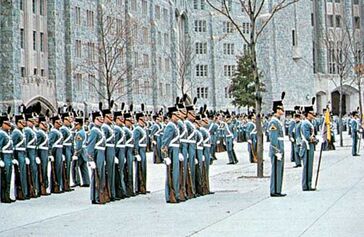
Pastel of PMA Cadets during their "Passing Out" Ceremony, circa 1854.
"Our Future is Our Country's Future."
- PMA Motto
The Philadelphia Military Academy, "The School of Kings," was originally built by the British during the First Seven Years' War as a small wooden base named "Fort Longtown," overlooking the city of Philadelphia. It trained both Army and Marine students, and originally had a small amount of Navy ones as well, before that branch developed its own college in Maryland, at Annapolis. After the Great Revolution, the American government originally planned to build a new officer school at West Point, New York. However, this was rejected by Aaron Burr (then in control of the project), when Tadeusz Kościuszko said Fort Longtown was a better choice. It already had adequate training facilties and the base had suffered minimal destruction during the Revolution, unlike its New York cousin. Over the course of decades, PMA became an outstanding college that gave trained many of America's most famous soldiers and politicians, most notable being, of course, Andrew I. Others, such as Hannibal Glas, and Martin Vanburen, did not become royalty, but still left and indelible mark on history. Clearly, without PMA, there might not have been an Andrew I, and all of history might have gone differently.
Notable Graduates[]
Andrew I held most school records for an extreme amount of time, some never being broken. He was, as the URAS Official Royal Biographer Martin L. Collins said, "an awesomely brilliant mind and body. He solved complex mathmeatical formulas in record times, was the undisputed fisticuffs master of the Academy, invented new ways to cheapen the process of making rifled muskets, and even devised a blueprint for a machine which later resulted in both the steam engine and the Industry Evolution." One of his teachers, Major Jacobus Rossevelt, said of him, "Young Jackson shows great promise. Never before have I seen any of the pupils demonstrate such a masterful knowledge of historical campaigns, or have the brains to sit down and draw up an imaginary plan for a French invasion of England, which he did earlier this afternoon. Recently, he even corrected a member of General Monroe's staff for making a tactical error during a skirmish drill." Not much information has survived of detailed specifics and he was known to have lost many of writings and essays during the frequent wars and campaigns of his early life, but he dominated PMA during his time there.
Duke Hunter DeRensis, by stroke of luck, was sent to the academy at age 16 by then Governor of Pennsylvania, Thomas Mifflin. As a student at the Philadelphia Military Academy, Hunter, his grades were above average, and he especially excelled in political history and philisophical thought. Having been accepted there on a favor and showing real interest to enter the field, Hunter remained at the academy for only two years (1795-1797). He graduated 8th in his class, out of 33 students. On his student years, he said in 1851, "I hold fond memories of the academy. Yes, when I first entered it, I promised myself I would someday be the superintendent. I can't tell you how fast that dream faded! It was a tough school, but it opened me up to the world around me, and prepared me to face the hardships I would face in battle in the coming years."
Hannibal Glas had a mixed time at PMA. He was at the social forefront of the school throwing and attending many parties and balls. However, his school results, while good (many teachers thinking him as a good, but not outstanding student), were lacking the effort he used for his amusements. He was said to be "more interested in wine and women then winning." Despite this attitude, Glas attended the academy for the maximum six years from 1833-1839, which left him out of the Moroccan War. This changed later in life, of course, during the Great South American War, which jumpstarted his military career in a huge way.
List of Students[]
- John I, King of the URAS and Successor of Andrew I
- Winfield Scott, (Grand Marshal, URAS Army)
- Arnold Featherston (General, Royal Legion)
- Harvey Williams (General, posthumously knighted, Royal Legion, KIA Second Seven Years' War, Battle of Chickamauga. Face appeared from 1888 to 1895 on the five dollar URAS Banknote)
- Thomas J. Jackson
- Robert E. Lee
- Cornelius Kennedy (Captain, 3rd Pennsylvania Field Artillery, KIA Second Seven Years' War, Battle of Little Egypt)
- Thomas Paine Davis (Kaintuck Citizen)